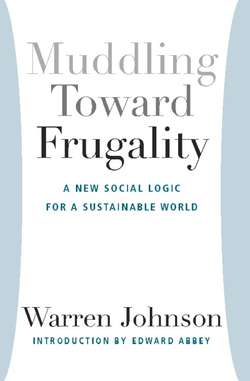Читать книгу Muddling Toward Frugality - Warren Johnson - Страница 11
На сайте Литреса книга снята с продажи.
Muddling as Political Adaptation
ОглавлениеIt may seem ironic to look on the stumbling of government as an asset in coming to terms with the future, but given the general resistance to change in any society, an inefficient government actually protects us from the dangers inherent in sustained economic growth to the point of overgrowth. Governmental inefficiency encourages—even forces—individuals to take their lives into their own hands, or in other words, to adapt.
There is little question that if the government could plan effectively, it would plan for the preservation of the world as it is now—and for continued growth. After all, in this relatively free democratic society, growth benefits virtually everyone; it produces jobs, incomes, tax revenues for government, profits for business, and it reduces the burdens of welfare. The memory of the Great Depression is a powerful part of the broad political consensus that the most important job of government is to get the economy going and to put people back to work. Presidents are reelected or defeated on the basis of their handling of the economy. Conservation issues are decided by their impact on the economy. Those measures that put people to work—on dams, pollution-control programs, improving parks—find much better acceptance than programs that threaten to slow the economy by restricting the use of resources, or by closing industrial plants that degrade the environment. If economic planning were more effective, economic growth would be faster and steadier, thereby increasing the danger of overgrowth now and precipitous changes later.
Fortunately, this kind of governmental effectiveness is not likely. Not only is our ability to plan limited, but natural tendencies are on the side of economic slowdown and forced adaptation to scarcities. It is not possible to deny the reality of declining oil and gas production, high prices for imported materials, and the huge capital costs to develop new energy sources. When we try to deny this reality, as we do when we place price controls on oil and natural gas, we only cause consumption to go up and create a greater imbalance with existing energy supplies.
Politicians are caught in a predicament; they are asked to keep prices down, to conserve energy, and to get the economy going. But it is not possible to do all of these things at once, and responsible political decisions are likely to be unpopular. Such dilemmas reflect, more than anything else, the contradictions of a growth-oriented economy operating under conditions of raw material scarcity.
Politicians are likely to find their difficulties getting worse as time passes and scarcity presses harder on us. They will have to deal with the thankless task of dividing up a pie that is becoming smaller; they will have to make cuts in existing programs, probably without reducing taxes, even as prices are increasing. Available funds will more and more be absorbed by programs no one ever expected would take so much of the federal budget: programs to develop new energy sources, to prop up faltering employment, and to deal with skyrocketing welfare and unemployment costs. A number of politicians, unable to satisfy their supporters, will find themselves out of a job.
Realistic planning that accepts the constraints of limited resources will be unpopular and resisted. Who will want to plan for stability or, worse yet, decline, especially after this period of our greatest power and influence? But when the struggle to prop up a way of life that is no longer practical becomes too great, a new economic orientation will emerge. It will receive the same reluctant commitment that Americans finally gave to the withdrawal from Vietnam; it will be preferable to more adverse economic and political reactions that threaten to tear the country apart. Contrary to the lament of frustrated promoters of change, politicians will act, but not until the writing is so clearly on the wall that they and, more important, their constituents cannot miss it. Once this realization is reached, the world will be seen in a new way. At that point, we will be over the hump, and the political decisions that follow can be expected to be more of a help than a hindrance.
In the meantime, the inability of government to resolve the problems facing us will encourage individuals to think about ways to secure a safe niche for themselves, rather than relying on government to take care of them. It is the prudent thing to do—to find a secure source of income, to get by with less, to protect children during their most vulnerable ages, and to avoid being trapped in a hazardous situation in old age. More and more individuals will develop cooperative arrangements with others to make life better and more satisfying.
In short, the dwindling faith in government’s ability to solve our problems (which we are already experiencing), will stimulate individual adaptation before it would otherwise be absolutely necessary, permitting a more orderly pace of change and more time to investigate alternatives.
